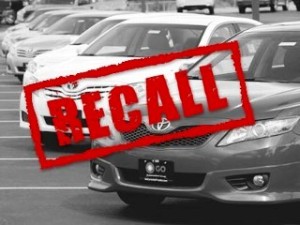Vehicle Defects Grow by the Millions
 In recent weeks, Takata Corporation air bag defects have been the subject of a recall for nearly 10 million vehicles. Affected makes and models include many names, including BMW, Chrysler, Ford, Honda, Mazda, Nissan and Toyota. Massive recalls were prompted by concerns that Takata Corp. air bags may endanger public safety by blowing up while cars are moving or failing to blow up in collisions.
In recent weeks, Takata Corporation air bag defects have been the subject of a recall for nearly 10 million vehicles. Affected makes and models include many names, including BMW, Chrysler, Ford, Honda, Mazda, Nissan and Toyota. Massive recalls were prompted by concerns that Takata Corp. air bags may endanger public safety by blowing up while cars are moving or failing to blow up in collisions.
Government Regulations Expand Air Bag Recall
Last week, the National Highway Traffic Safety Administration (NHTSA) expanded its mandatory recall to more than half a dozen different automakers. This was reportedly due to at least two deaths linked to Honda vehicle defects caused by inflating air bags that propelled metallic fragments into passenger compartments.
Consequently, NHTSA expanded its recall to protect vehicle occupants from serious personal injury sustained by spontaneous blasting of metal shards into interior areas. A major secondary catalyst of NHTSA’s recent move is reports that excessive humidity causes air bags to malfunction. The NHTSA Office of Vehicle Defects investigation has recently fielded six reports of spontaneous air bag ruptures in especially humid Florida and Puerto Rico climates.
NHTSA Probe Nothing New For Takata
NHTSA’s recent industry wide recall followed a prior announcement made less than two weeks earlier that the agency had launched a formal investigation into Takata air bags. NHTSA Office of Defects Investigation further revealed an ongoing investigation into three reported incidents of serious injuries to vehicle occupants that occurred when air bags spontaneously ruptured.
Specific models included in vehicle defects recall include:
- Honda- Approximately 2 million models manufactured from early 2000 to late 2002.
- Mazda- About 160,000 models in several makes manufactured between 2003 and 2008.
- Nissan- Approximately 755,000 models manufactured from 2001 to 2003.
- Toyota- Estimated 2.3 million imports produced between 2001 and December of 2004.
- Ford- Some models initially bought or registered in FL, HI, PR and VI with air bags that fail to inflate when weather is exceptionally humid.
- BMW- Corporate representatives recently stated that BMW has not identified any specific vehicle defects that fall within NHTSA’s broadened recall criteria. Spokespersons further disclosed, however, that BMW has not completed its recall of certain previously identified defective vehicles.
- Chrysler- Automaker claims that efforts are currently underway to ascertain specific serial numbers to notify owners of possible vehicle defects from bad air bags. Chrysler also recently announced voluntary implementation of field safety testing and air bag inflator replacements for some models manufactured from January 1, 2004 to June 30, 2007.
2014 Record Year for Vehicle Defects Recalls
By the end of May 2014, there was an all-time record for defective auto recalls. The close of April 2014, for instance, witnessed automakers forced to recall more than 13 million cars in just the U.S. alone. That figure becomes even more shocking when put into comparative perspective of 22 million vehicles recalled during the entire 2013 calendar year.
Injured? Seek Legal Help
Vehicle defects can result in accidents that can be devastating physically, emotionally, and financially. If you or a loved one has been injured or even killed, seek help to learn about your options. Attorney Group is here to help you understand your options in your particular situation, and can connect you with an affiliated attorney, all at no cost to you. Contact us today to learn more.





